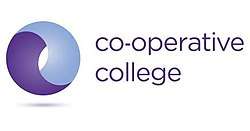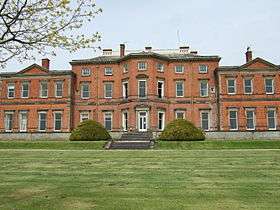Co-operative College
Co-operative College is a British educational charity dedicated to the promotion of co-operative values, ideas and principles within co-operatives, communities and society.[2]
 | |
| Co-operative | |
| Founded | 1919 |
| Headquarters | , |
Area served | Manchester, England |
Key people | Dr Cilla Ross, Principal and Chief Executive |
| Website | co-op.ac.uk |
Origins and development

The Co-operative College was established in 1919 by the Co-operative Union with ten overseas students based on the second floor of Holyoake House, Manchester, and in 1943 the College became a charitable trust.
In 1945, Holyoake House was damaged by a blitz, and the Co-operative College was forced to relocate to Stanford Hall, where it spent almost fifty years. Along the years that the College spent in Stanford, it ran residential courses in social/economic subjects for adult learners and a wide range of retail and management courses for co-operative employees. In 1946, Dr Robert L. Marshall, OBE, MA, became the Principal and Chief Executive Officer and built up the reputation of the College as a national and international institution.
The College has since returned to its original home at Holyoake House, and Dr Cilla Ross is Principal and Chief Executive.
Key areas of work
- Researching co-operatives
- Co-operative Learning and Development
- Co-operatives Globally - International work
- Co-operative Heritage
- Schools and Young People
Research
The Research team works with a growing number of partners from the co-operative movement and the higher education sector carrying out research into the historical and contemporary role of co-operation. The Co-operative College is working hard to disseminate research that makes society aware of the impact of the co-operative movement.
Learning and development
The Co-operative College works with all the major co-operative societies in the U.K. and delivers programmes of training and education around the world, to help individuals and groups achieve the level of skill, knowledge and understanding required to translate ideals into effective practice.
The College learning team ensures that all the members, directors, managers and employees have training programmes designed to meet their needs, always with the Co-operative Values and Principles at the heart of all training.
International work
The Co-operative College works in nearly 20 countries in Africa and the Asia/Pacific region. The College’s international work is supporting co-operatives in the common global endeavor to end poverty and create a fairer world for all.
Some of its partners overseas are:
- Co-operative Colleges in Africa.
- The International Labour Organisation.
- The United Nations agency responsible for co-operatives.
- The International Co-operative Alliance.
- The coordinating body of the co-operative movement.
- Individual co-operatives.
Its international work includes:
- Modernising their curriculum and teaching methods in Africa.
- Managing the long term reconstruction of the damage provoked by the massive earth quake[3]
- Helping South African families reduce funeral costs.
Heritage
The Heritage team at the College is responsible for ensuring that all artifacts and documentation in relation with the co-operative movement are collected, safeguarded and made accessible for lifelong learning and research.
People interested in knowing about the extraordinary history and development of the worldwide co-operative movement, its heritage and contemporary relevance can approach it through the Rochdale Pioneers Museum[4] and the National Co-operative Archive.
Schools and young people
The College, following the steps of Robert Owen, considers education as an underpinning element, and is involved in projects that reach school and young people in different fields.
In partnership with the Co-operative Group, the College is developing a network of schools specialised in Business and Enterprise.
In the U.K., the College is developing new models to run schools as co-operatives; the co-operative trust schools are schools that are set up like co-operatives.
Besides this, the Co-operative College also has its “Young Co-operative” programme,[5] which any school can become involved with. This programme encourages pupils to create their own co-operative business.
See also
References
- MCITP + CCNA
- Co-operative Values Make a Difference - Co-operative College Strategic Plan 2008-2010 (PDF), Co-operative College, retrieved 18 January 2010
- Stirling Smith (2007) After the Angry Sea: co-operatives and the tsunami
- "The Co-operative Heritage Trust". The Co-operative Heritage Trust. Retrieved 2020-01-14.
- "Archived copy". Archived from the original on 2012-06-20. Retrieved 2012-06-26.CS1 maint: archived copy as title (link)